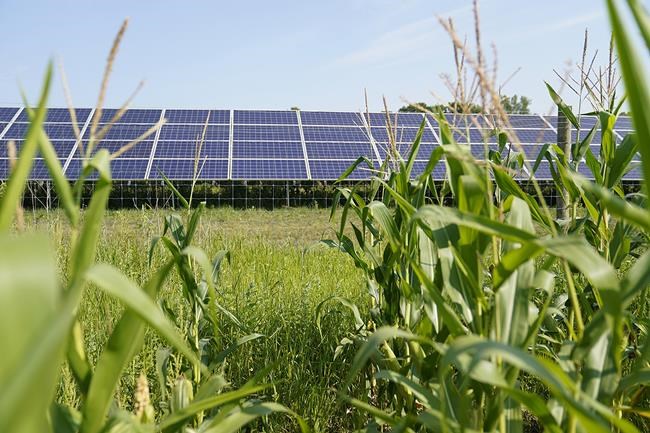Minnesota Governor Confident Energy Bill Will Withstand ND Lawsuit Challenge
ST. PAUL, Minnesota (AP) – Democratic Gov. Tim Walz signed legislation Tuesday requiring Minnesota utilities to get 100% of their electricity from carbon-free sources by 2040, and said he’s confident there’s a looming lawsuit from coal and gas manufacturing from North Dakota.
Republican North Dakota Gov. Doug Burgum this week renewed his threat to sue his neighboring state over the requirements. He tried unsuccessfully to persuade Minnesota lawmakers, as the bill was taking shape, to make changes to ensure North Dakota’s utilities — which export electricity from coal and natural gas to Minnesota — would not be harmed.
“I’m not a lawyer, but I’m surrounded by very good ones,” Walz told reporters after signing the law. “I trust this law is solid. I have faith that it will last because that’s exactly what it was written for.” .. And just to be clear, Minnesota isn’t betting our future on coal and carbon.”
Walz added that he found it “regrettable” that Burgum was prepared to sue and that it would be more productive if North Dakota joined Minnesota and the rest of the country instead.
“The fact is, Minnesota is moving into the future and they have to come eventually,” Walz said.
The Minnesota Senate passed the plan Thursday by a 34-33 party line after the House of Representatives approved it 70-60 the week before. Republican lawmakers said it would increase costs for consumers while undermining the reliability of the power grid. Rural utilities said they were struggling to comply.
According to the Clean Energy States Alliance, 21 other states have already set standards or targets for 100% clean energy, most with target dates between 2040 and 2050. Minnesota’s previous standard, set in 2007, aimed to reduce total statewide greenhouse gas emissions to 80%. to lower. until 2050.
“The adoption of 100% clean energy targets by a growing number of states has been one of the most important energy policy developments in recent years,” Warren Leon, the Alliance’s executive director, said in a statement. These states are particularly notable given the state’s historical leadership in clean energy policy was and its new targets are ambitious and meaningful.”
At a meeting of the North Dakota Industry Commission Monday, Burgum said the U.S. Constitution’s Commerce Clause and other laws prohibit Minnesota from having a say over how North Dakota businesses operate.
“By regulating the percentage of electricity sold, they exaggerate and essentially undermine North Dakota businesses,” the Bismarck Tribune quoted Burgum as saying. The commission set aside $1 million to pay for litigation and voted to ask lawmakers for $3 million, the newspaper reported.
But Burgum also told the commission — which consists of himself, North Dakota Attorney General Drew Wrigley, and Agriculture Commissioner Doug Goehring — that her state officials would continue to try to reach a settlement with Minnesota to avoid a lawsuit, the reported tribunes.
In a letter to their Minnesota counterparts last month, Burgum and the other commissioners said Minnesota’s plan threatens tax revenues from North Dakota’s energy industry, which they are counting on to boost their state’s carbon capture, hydrogen power and other “decarbonization” initiatives “ to finance “ their energy sources
They also noted that federal courts ruled against Minnesota when North Dakota and its utilities challenged a portion of the Minnesota Next Generation Energy Act of 2007, which attempted to ban the import of electricity that would increase statewide carbon emissions from the sector. The 8th Circuit Court of Appeals said in 2016 that Minnesota could not do so without congressional approval.
San Francisco-based Climate Cabinet Action, a political action committee that backs candidates who support the fight against climate change, said Burgum’s threat is part of a new trend of fossil-fuel industry backlash against pro-climate states or localities -Adopt measures.
“States suing other states for passing pro-climate policies is just another tactic used by fossil fuel lobbyists to protect their particular interests and bottom line,” said Caroline Spears, the group’s executive director. in a statement.
The group said these court challenges aren’t working, citing a lawsuit brought by the state of Utah and fossil fuel companies against a San Francisco Bay community that banned the handling and storage of coal and petroleum coke. As part of a 2021 settlement, a private port operator in the city of Richmond, California that handles the fuels was given until 2027 to continue those operations.
And it referenced a 2012 US Supreme Court decision preventing Wyoming and Montana from suing Washington state for refusing a key permit to build a coal export dock that would have sent coal to Asia. The two big coal-mining states have sought to boost exports to prop up an industry in decline as US utilities switch to gas-fired power and renewable energy.
Steve Karnowski, The Associated Press
Don’t miss interesting posts on Famousbio










